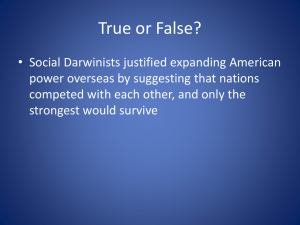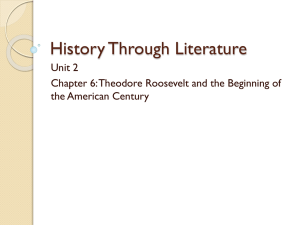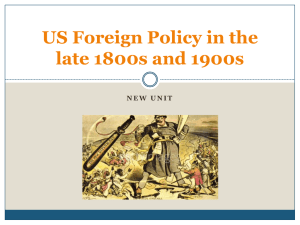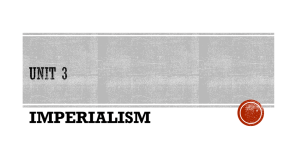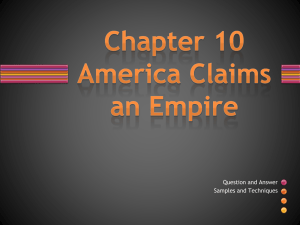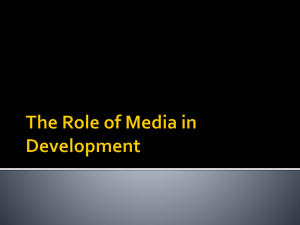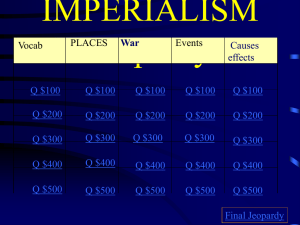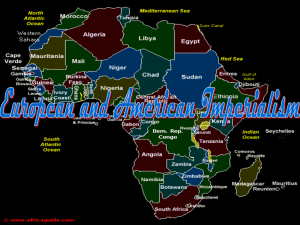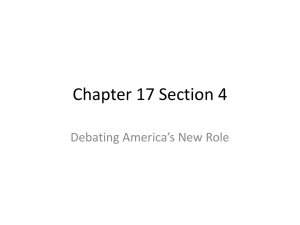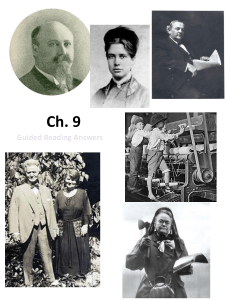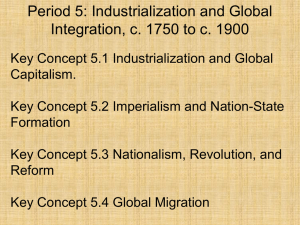File - Mr. Mick`s social studies
advertisement
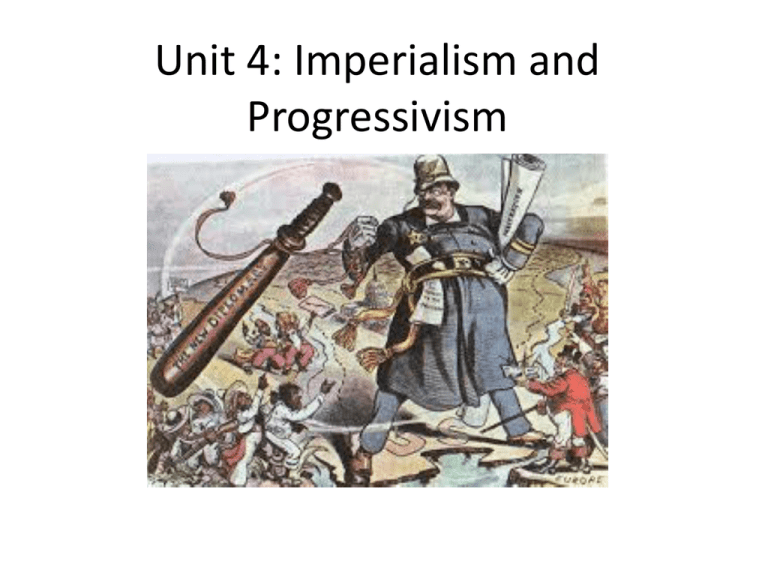
Unit 4: Imperialism and Progressivism 4-1: Imperialism part I • In the late 19th century the U.S. engaged in imperialism: – The economic and political domination of a stronger nation over a weaker one • Why did the U.S. engage in imperialism? 1. Raw materials for factories 2. More markets for goods 3. Racism: people in weaker countries are inferior, we must civilize/Christianize them 4-1: Imperialism part I • Foundations for imperialism laid by the Monroe Doctrine in 1823 – Issued by the U.S., said no European intervention in Western hemisphere • First place U.S. engages in Imperialism—Japan – Commodore Matthew Perry forces Japan to open Tokyo Bay to trade with the West. • U.S. businesses under Sanford Dole also forcibly remove Queen Liliuokalani from the throne in Hawaii – Businesses wanted control of sugar, fruit plantations – Hawaii is annexed as American territory by 1898 4-1: Imperialism part I • Supporters of Imperialism thought U.S. needed a big navy • They were influenced by Alfred Thayer Mahan – President of naval war college, said U.S. needed big navy to protect its commercial fleet – Also supported imperialism because U.S. could gain ports around the world 4-1: Imperialism part I • Supporters of Imperialism in U.S. turned attention to Cuba – Rebels had turned against the Spanish – A famous rebel leader in exile in New York was Jose Marti • American newspapers under Joseph Pulitzer and William Randolph Hearst engaged in yellow journalism: – Exaggerated stories designed to influence public opinion for war • One situation exaggerated in newspapers was the de Lome letter: – Spanish foreign minister de Lome insults president McKinley, newspapers blow it out of proportion to get country to favor war 4-1: Imperialism part I • Then, in Feb. 1898 U.S. battleship U.S.S. Maine blows up in Havana Harbor • President McKinley urges caution, doesn’t want to go to war • Politicians in Republican party wanted to unite the country through pro-war feelings – Uniting a country through pro-war sentiment is known as jingoism Note Quiz 1. What were the three reasons the U.S. participated in Imperialism? 2. Why did the U.S. remove Queen Liliuokalani from her throne? 3. What did Alfred Thayer Mahan say the U.S. needed, and why? 4. Define jingoism 5. What was one situation where yellow journalism was used by American newspapers to influence people towards war? 4-2: Imperialism part II • The United States declares war on Spain in 1898 • George Dewey leads American navy against Spanish in the Philippines at Manila Bay— American victory • In Cuba, Teddy Roosevelt leads a volunteer regiment, nicknamed the “Rough Riders” against the Spanish 4-2: Imperialism part II • Treaty of Paris gives Cuba independence, Puerto Rico, Guam go the U.S.; Philippines sold to the U.S. for 20 million. • Emilio Aguinaldo rebels against U.S. rule in Philippines, Americans force Filipinos into concentration camps • Congress passes the Foraker Act (1900); makes Puerto Rico a territory, gives it some self-rule • Platt Amendment is passed regarding Cuba 1. 2. 3. 4. Cuba can’t make treaties with other nations Cuba has to give U.S. naval bases Cuba has to keep debt low U.S. can intervene to “protect” Cuban independence 4-2: Imperialism part II • U.S. wants a sphere of influence in China. • Gets European nations to agree to Open Door policy. Why? 1. U.S. doesn’t want any one European nation dominating China 2. U.S. wants to keep China open as a market • Boxer Rebellion was a revolt of Chinese shadow-boxers against Western influence – International force puts down the rebellion 4-2: Imperialism part II • U.S. had larger navy, nicknamed “Great White Fleet”; but it needed way to get from AtlanticPacific quickly • U.S. asked Columbia to build Panama Canal, Columbia refused; U.S. helped start a revolt in Panama, Panama allows U.S. to build Canal • President Roosevelt issues Roosevelt Corollary to Monroe Doctrine – U.S. will intervene in affairs of Latin American nations to maintain political and economic stability. 4-2: Imperialism part II • Presidents Roosevelt and Taft believed in “big stick/dollar diplomacy” – Belief that U.S. businesses should have an interest in economic development of Latin America, China. • President Woodrow Wilson believed in “missionary/moral diplomacy” – Belief that U.S. had a obligation to promote human rights, self-deter in Latin America Note Quiz 1. What was the nickname of the volunteer regiment led by Teddy Roosevelt in Cuba? 2. What were the 4 parts of the Platt Amendment? 3. Why did the U.S. work to get the Open Door policy in China accepted? 4. Why did the U.S. encourage Panamanians to revolt against Colombia? 5. President Wilson’s belief that the U.S. should promote human rights in Latin America was known as… 4-3: Progressivism • Many poor social conditions existed in late 19th early 20th century: – – – – Dirty cities/crime Political corruption Poverty/large gap between rich and poor Poor working conditions/labor standards • Muckrakers were journalists who revealed these problems – Jacob Riis: exposed filth, crowding of cities – Ida Tarbell: exposed political corruption 4-3: Progressivism • Reforms in government occur – How to lead a city? • City commission: city is run by board of experts, not elected official (in theory, less corruption, political machines) • National reforms – Direct primary: all people can vote for their party’s candidate to run in general election – Initiative: voters can get issue put on ballot – Referendum: voters can vote on issues – Recall: voters can take elected officials out of office if they do poorly 4-3: Progressivism • Women push for suffrage—the right to vote, and get it with the 19th amendment (1919) • Women also want Prohibition of alcohol— think alcohol a social evil – Prohibition is passed as 18th amendment, bans sale and consumption of alcohol 4-3: Progressivism • Roosevelt reforms (very active in executive/legislative branch) – Labor: Roosevelt negotiated agreement between miners union (United Mine Workers), management – Business: Roosevelt known as “trustbuster” breaking up trusts he thought created monopolies – Consumerism: Roosevelt gets government reforms passed after reading Upton Sinclair’s “The Jungle” • A book that detailed the disgusting conditions in Chicago meatpacking industry – Environment: passed laws regarding water management, set aside western lands for national parks • Roosevelt was a friend of environmentalist John Muir, who started the Sierra Club 4-3: Progressivism • Taft becomes President after Roosevelt, but does not carry on reforms, angers Roosevelt • Roosevelt creates Progressive “Bull Moose” Party, a third party, to run against Taft • Democrat Woodrow Wilson wins 1912 election because Taft, Roosevelt split Republican vote. Note Quiz 1. Why did Woodrow Wilson win the 1912 election? 2. What constitutional amendment gave women the right to vote? 3. Whose book convinced Teddy Roosevelt to get reforms in food safety passed? 4. What did John Muir start? 5. What amendment banned the sale and consumption of alcohol?
